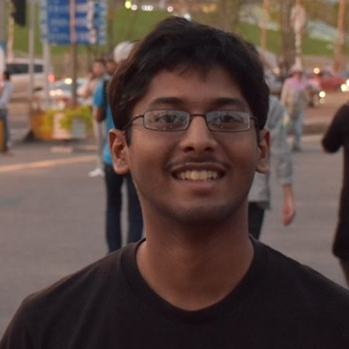Exploring Quantum Frontiers: A Journey from BITS Pilani to Advanced Research
Meet Amit Jamadagni, an alumnus of BITS Pilani (Pilani Campus, ‘16), where he pursued a dual degree in B.E. Electrical and Electronics Engineering and M.Sc. Mathematics. He went on to complete his Ph.D. in Theoretical and Mathematical Physics from Leibniz Universitäit Hannover, and is currently working at Oak Ridge National Laboratory, USA, as a Postdoctoral Research Associate.

How did your time at BITS Pilani shape your career plans? What all extracurricular or club activities were you involved in, here?
I think the exposure to a wide variety of topics, and programs, and especially the interaction with peers helped me gain a lot of perspective across a variety of domains. In addition, the time and freedom allowed me to explore and make connections with what I was studying. The structure of the academic curriculum is well designed allowing to take off on tangents that are of interest. I was not in particular part of any club but I did participate in two editions of Google Summer of Code ('14 and '15) where I contributed to developing modules in open-source software packages.
Your work as a research intern at the University of Leeds and Fudan University, both of which were during your undergraduate years, is quite impressive. How did you go about securing a position like that?
I was more inclined to pursue Physics during my pre-undergrad days. Given that I got into Mathematics helped me understand physics from an abstract standpoint. The theorems of abstract math were applications in the Physics land and this way I slowly started to build interest in topics of quantum computing (especially something called topological quantum computing). I started to read more about this particular computing paradigm and emailed Professors for a position in the summer of the third year for a research internship mainly outlining my understanding and the connections I could make from the things I learned. Later, having gained more insight into the understanding of the theory, I ended up doing my Master’s thesis in a very related domain again by writing to a few more professors in the related field.
With the increasing amount of transistors on an IC slowing down due to heating and spatial limitations, we can see the empirical Moore's law showing inconsistencies. What avenues are being pursued to increase computational power?
I can think of two but there are more. One is High Performance Computing (HPC) clusters wherein many classical compute units are optimally designed to talk to one other thereby allowing for a lot more compute power. The other is quantum computing which is based on the laws of quantum mechanics and is at least theoretically proven to be advantageous in solving some of the computational tasks. Currently, there is also great interest in integrating HPC clusters with quantum computers to utilize the best of both classical and quantum worlds.
Quantum Computation is quite an esoteric topic, but it is talked about with much awe. Can you explain what distinguishes it and the prospects it holds?
The key aspect that distinguishes quantum computing from its peers is the underlying physics itself. In other words, it is not a conventional shift from CPUs to GPUs but rather a more dramatic shift where the underlying computing principles are based on the principles of quantum mechanics. When we think of classical computing, we can naively think of it as a group action of electrons with a toggle on voltage to realize computation. However, we can go further deeper and control atoms at an individual level. This is where quantum laws chip in with the conventional classical theory no longer remaining valid. The control of the atoms provides us with more computational capabilities, however, we depart from being deterministic to probabilistic, thereby leading to new ways of thinking about computing itself. The prospects it holds are huge as there are predicted computational gains across a huge spectrum; from solving combinatorial optimization problems (think of supply chain gains) to cryptography (national security issues).
Given the probabilistic outcomes of a Quantum computer, do you consider that it holds any applications at domestic (personal or household) levels in the foreseeable future?
The applications might not be too visible for public consumption but if successful, there might be huge gains in the background where we have more efficient and secure algorithms. For example, e-commerce companies can design more efficient supply chain algorithms leading to lesser energy consumption and more efficient delivery mechanisms. The impact on delivery times might not be heavily reduced but the way the distribution goes about can get more efficient by integrating quantum computing-based algorithms. As another example, the current encryption standards might get more robust, given that the quantum algorithms can easily break the current standards. All in all, from my understanding, the shift will be in making the current versions more efficient rather than the laptop/mobile-like evolution we have witnessed in the last 20 years.
What would you suggest for an undergraduate student at BITS Pilani who wishes to pursue research opportunities in fields similar or contemporary to yours, to go about doing so?
I would suggest keep reading more about the things one is interested in and trying to make connections to what is being learned, either curriculum-wise or out of self-interest. Two paths might appear to diverge; however, going further might reveal strong and surprising intersections leading to the emergence, or maybe, a grandiose picture.
You Might Also Like
- BITS to Baker Hughes: Shad Hussain’s Journey Through Turbulent Times
- Be Cool: Navigating Life, Literature, and Mental Health with Shashi Warrier
- Coaching Across Cultures: Brajesh Bajpai’s Journey of Learning, Leading, and Adapting
- From Engineer to AI Leader: An Interview with Akhil Singhal on Startups, Strategy, and the Future of Gen A
- From Circuits to Capital Markets: Deepak Joshi’s Global Finance Journey














